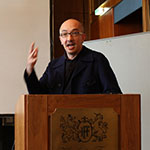Euroacademia Conferences
 Europe Inside-Out: Europe and Europeanness Exposed to Plural Observers (9th Edition) April 24 - 25, 2020
Europe Inside-Out: Europe and Europeanness Exposed to Plural Observers (9th Edition) April 24 - 25, 2020 Identities and Identifications: Politicized Uses of Collective Identities (9th Edition) June 12 - 13, 2020
Identities and Identifications: Politicized Uses of Collective Identities (9th Edition) June 12 - 13, 2020 8th Forum of Critical Studies: Asking Big Questions Again January 24 - 25, 2020
8th Forum of Critical Studies: Asking Big Questions Again January 24 - 25, 2020 Re-Inventing Eastern Europe (7th Edition) December 13 - 14, 2019
Re-Inventing Eastern Europe (7th Edition) December 13 - 14, 2019 The European Union and the Politicization of Europe (8th Edition) October 25 - 26, 2019
The European Union and the Politicization of Europe (8th Edition) October 25 - 26, 2019 Identities and Identifications: Politicized Uses of Collective Identities (8th Edition) June 28 - 29, 2019
Identities and Identifications: Politicized Uses of Collective Identities (8th Edition) June 28 - 29, 2019 The European Union and the Politicization of Europe (7th Edition) January 25 - 26, 2019
The European Union and the Politicization of Europe (7th Edition) January 25 - 26, 2019 7th Forum of Critical Studies: Asking Big Questions Again November 23 - 24, 2018
7th Forum of Critical Studies: Asking Big Questions Again November 23 - 24, 2018 Europe Inside-Out: Europe and Europeanness Exposed to Plural Observers (8th Edition) September 28 - 30, 2018
Europe Inside-Out: Europe and Europeanness Exposed to Plural Observers (8th Edition) September 28 - 30, 2018 Identities and Identifications: Politicized Uses of Collective Identities (7th Edition) June 14 - 15, 2018
Identities and Identifications: Politicized Uses of Collective Identities (7th Edition) June 14 - 15, 2018
Western Confessionalization of Eastern Europe as Practiced in the Former Yugoslavia
-
-

-
Presentation speakers
- Bojan Aleksov, The School of Slavonic and East European Studies, University College London, UK
Abstract:
The preponderant role of religion and confessional segmentation as a result of Orthodox-Byzantine and Islamic-Ottoman legacy are often considered the chief markers that distinguish the ‘Eastern’ from the ‘Western’ Europe. Historical research has in the meantime delegitimized this view offering more nuanced and differentiated approach especially illuminating the contribution of nationalism as a “Western” import to the alleged age-old identification of religion and nation as well as to the conflicts in the last two centuries among confessionally mixed populations of Eastern Europe and the Balkans.
My paper analyses more recent developments, dating back to 1989, when East-West opposition and associated differences regarding the role of religion were expected to disappear. Taking examples from the conflict in former Yugoslavia and successive efforts at democratization and the integration into the European Union of its constitutive parts I attempt to show that what actually took place was the contrary. More specifically I will demonstrate how many policies and interventions of the European Union and other “Western” political, educational, humanitarian and media agencies, putatively termed confessionalization (Reinhard and Schilling), contributed to the petrification of confessional segmentation and buttressed conservative political attitudes of religious leaders and institutions. International mediators and media promoted religious hierarchs into national leaders; confessional catechism was established along Western models; religious charitable institutions privileged and special inter-confessional bodies introduced who only reinforced the existing confessional leaderships and divisions. In addition many political and social requirements concomitant with the accession into the European Union from restitution of the private property to commemoration of the Holocaust opened new avenues for the engagement of conservative religious hierarchies and fortified their position within nascent democratic states.
-
Related Presentations

The Shrine in Licheń: Redefining Religiosity and Entertainment
- Helena Chmielewska-Szlajfer

















